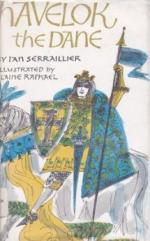Our king on the west coast of Denmark, where the story of Havelok the Dane must needs begin, was Gunnar Kirkeban—so called because, being a heathen altogether, as were we all in Denmark at that time, he had been the bane of many churches in the western isles of Scotland, and in Wales and Ireland, and made a boast thereof. However, that cruelty of his was his own bane in the end, as will be seen. Otherwise he was a well-loved king and a great warrior, tall, and stronger than any man in Denmark, as was said. His wife, the queen, was a foreigner, but the fairest of women. Her name was Eleyn, and from this it was thought that she came from the far south. Certainly Gunnar had brought her back from Gardariki,[2] whither he had gone on a trading journey one year. Gunnar and she had two daughters and but one son, and that son was Havelok, at this time seven years old.
Next to the king came our own lord, Jarl Sigurd, older than Gunnar, and his best counsellor, though in the matter of sparing harmless and helpless church folk his advice was never listened to. His hall was many miles from the king’s place, southward down the coast.
Here, too, lived my father, Grim, with us in a good house which had been his father’s before him. Well loved by Jarl Sigurd was Grim, who had ever been his faithful follower, and was the best seaman in all the town. He was also the most skilful fisher on our coasts, being by birth a well-to-do freeman enough, and having boats of his own since he could first sail one. At one time the jarl had made him steward of his house; but the sea drew him ever, and he waxed restless away from it. Therefore, after a time, he asked the jarl’s leave to take to the sea again, and so prospered in the fishery that at last he bought a large trading buss from the Frisian coast, and took to the calling of the merchant.
So for some years my father, stout warrior as he proved himself in many a fight at his lord’s side, traded peacefully—–that is, so long as men would suffer him to do so; for it happened more than once that his ship was boarded by Vikings, who in the end went away, finding that they had made a mistake in thinking that they had found a prize in a harmless trader, for Grim was wont to man his ship with warriors, saying that what was worth trading was worth keeping. I mind me how once he came to England with a second cargo, won on the high seas from a Viking’s plunder, which the Viking brought alongside our ship, thinking to add our goods thereto. Things went the other way, and we left him only an empty ship, which maybe was more than he would have spared to us. That was on my second voyage, when I was fifteen.
Mostly my father traded to England, for there are few of the Saxon kin who take ship for themselves, and the havens to which he went were Tetney and Saltfleet, on the Lindsey shore of Humber, where he soon had friends.
So Grim prospered and waxed rich fast, and in the spring of the year wherein the story begins was getting the ship ready for the first cruise of the season, meaning to be afloat early; for then there was less trouble with the wild Norse Viking folk, for one cruise at least. Then happened that which set all things going otherwise than he had planned, and makes my story worth telling.




